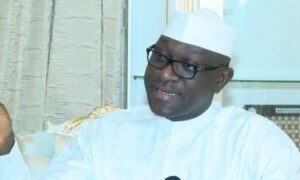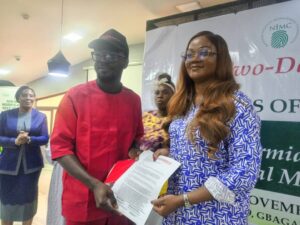


Uba Sani’s revelation sparks fresh concerns on debt profile, financial stability of States
…As SERAP gives Wike, others seven days to publish loan agreements, account for N5.9trn, $4.6bn loans
The revelation by Governor of Kaduna State, Uba Sani over the debt profile of the state has since sparked renewed concerns on the debt profiles of other states.
According to data released last week by the Debt Management Office (DMO) on the debt profile of states in the country, 36 states and the Federal Capital Territory (FCT) owe a cumulative debt of N5,862,845,931,217.41 as at December 2023.
Lagos recorded the highest debt amounting to N1,048,703,617,143.87 while Delta State and Ogun state followed with N373,407,744,509.06 and N278,675,120,734.01 respectively.
Although experts and renowned worldwide financial organisations have always argued that borrowing isn’t entirely bad depending on the situation. However, it is becoming quite worrisome for the Nigerian states as the states are being unable to perform optimally due to paucity of funds.
Though the Federal allocation has increased due to the removal of subsidy, it is still a far cry as many states are plunged into debts to service infrastructure projects in their state.
Lamenting, the Kaduna state governor, Senator Uba Sani, speaking on Saturday at a Town Hall Meeting, tagged: “The State of Kaduna state,” Sani said the situation is such that the government will have to continue to borrow to be able to pay workers salaries.
According to him, the debt burden includes $587 million, N85 billion and N115 billion contractual liabilities, “sadly inherited from the previous administration.”
The Governor however declared that despite the financial challenges, his administration remains resolute in steering the state towards progress and sustainable development.
“Kaduna state only receives N3.6 billion after deduction of N7.2 billion for debt servicing.
“What we received from the federal allocation in Kaduna this month was N3.6 billion out of over N10 billion. The sum of N7.5 billion was deducted from our allocation to service debts.
“We cannot pay salaries without borrowing. Our salary bill is N5.2 billion. We will have to borrow N2 billion to be able to pay salaries.
Speaking further, the Governor said he had approached President Bola Tinubu for assistance.
Sani said, “I have taken our cry to the President over these deductions. The President told me that the debt of $556 million is a World Bank debt and there is nothing he can do about it.
“He however promised to see how he could help us. Some of my governor colleagues have also promised to approach the President to assist Kaduna. In the next three months we will be collecting N3.6 billion from the federal allocation.”
Sani said, “Despite the huge debt burden of 587 million Dollars, 85 billion Naira, and 115 billion Naira contractual liabilities sadly inherited from the previous administration, we remain resolute in steering Kaduna State towards progress and sustainable development.
“We have conducted a thorough assessment of our situation and are sharpening our focus accordingly.
“It gladdened my heart to inform you that, despite the huge inherited debt on the state, till date, we have not borrowed a single kobo.”
He said the priority areas of his government include safety and security, Housing, Education, Healthcare, and Support for Micro, Small, and Medium Enterprises (MSMEs).
“We are also prioritising inclusive development by investing in human capital, stimulating the economy, and providing affordable housing.”
The governor appealed to citizens of the state, especially, workers to understand the present predicament being faced by the state.
He said since coming to office a lot of progress had been made in improving our security by revamping of Kaduna State Vigilance Service (KADVS); recruitment of 7,000 additional personnel for KADVS; training and equipping of the newly recruited personnel; building of additional security outposts for KADVS at the seven LGAs that are prone to insecurity; purchasing of Hilux vehicles and 100 motorcycles for Kaduna Vigilance Service (KADVS) to enhance their operations.
“We are strengthening our collaboration with security agencies and fashioning more effective strategies to checkmate and degrade the evil elements laying siege to our communities.
“We are also closely engaging with neighboring states to develop joint strategies and carry out joint operations against the criminal elements.”
Responding to the allegations of the Governor against his father, House of Representative member and son of the former Governor, Bello Rufai said, “I am loyal to Governor Uba Sani, and I will not criticise him publicly. No one will make me do that. He mentored me, gave me my first government job, and believed in my election. This too shall pass. The rural development being done in Kaduna State is impressive.
“The governor is the leader of the state, and for the sake of transparency, even though Mallam as the outgoing governor put it in his outgoing speech how much money he is leaving in the state, it is within the governor’s—let me take that back—it is the duty, of course, for the sake of transparency, to let the citizens of the state know the financial condition.”
Meanwhile, the Socio-Economic Rights and Accountability Project (SERAP) has urged Nigeria’s 36 state governors and the Minister of the Federal Capital Territory, Abuja, Mr Nyesom Wike to “widely publish copies of the loan agreements and spending details of some N5.9 trillion and $4.6 billion loans obtained by their states and the FCT, including details and locations of projects executed with the loans.”
SERAP also urged them to “promptly invite the Independent Corrupt Practices and Other Related Offences Commission (ICPC) and Economic and Financial Crimes Commission (EFCC) to investigate the spending of the domestic and external loans obtained by your state and the FCT.”
SERAP’s request followed the disclosure last week by Governor Uba Sani of Kaduna State that the immediate past administration of Nasir El-Rufai left $587m, N85bn debt and 115 contractual liabilities, making it impossible for the state to pay salaries.
In the Freedom of Information requests dated 30 March 2024 and signed by SERAP deputy director Kolawole Oluwadare, the organisation said: “It is in the public interest to publish copies of the loan agreements and details of how the loans obtained are spent.”
SERAP said, “Nigerians have the right to know how their states are spending the domestic and external loans obtained by the governors.”
SERAP said, “Widely publishing copies of the loan agreements and spending details of the loans obtained would ensure that persons with public responsibilities are answerable to the people for the performance of their duties in the management of public funds.”
The FoI requests, read in part: “We would be grateful if the recommended measures are taken within seven days of the receipt and/or publication of this letter. If we have not heard from you by then, SERAP shall take all appropriate legal actions to compel you and your state to comply with our request in the public interest.”
“SERAP is seriously concerned that many of the country’s 36 states and FCT are allegedly mismanaging public funds which may include domestic and external loans obtained from bilateral and multilateral institutions and agencies.
“Transparency in the spending of the loans obtained by your state is fundamental to increase accountability, prevent corruption, and build trust in democratic institutions with the ultimate aim of strengthening the rule of law.
“According to Nigeria’s Debt Management Office, the total public domestic debt portfolio for the country’s 36 states and the Federal Capital Territory is N5.9 trillion. The total public external debt portfolio is $4.6 billion.
“Many states and the FCT reportedly owe civil servants’ salaries and pensions. Several states are borrowing to pay salaries. Millions of Nigerians resident in your state and the FCT continue to be denied access to basic public goods and services such as quality education and healthcare.
“Several states including your state are also reportedly spending public funds which may include the domestic and external loans to fund unnecessary travels, buy exotic and bulletproof cars and generally fund the lavish lifestyles of politicians.
“SERAP is seriously concerned that the domestic and external loans obtained by your state and the FCT are vulnerable to corruption and mismanagement. Your government has a responsibility to ensure transparency and accountability in how any loans obtained by your state are spent, to reduce vulnerability to corruption and mismanagement.
“Publishing copies of the loan agreements obtained by your state and the FCT would allow Nigerians to scrutinise them, and promote transparency and accountability on the spending of public funds including the loans obtained.
“SERAP believes that providing and widely publishing the details of the spending of the domestic and external loans obtained by your state and the FCT would enable Nigerians to effectively and meaningfully engage in the management of the loans.
“SERAP believes that the constitutional principle of democracy also provides a foundation for Nigerians’ right to know the details of loan agreements and how the loans obtained are spent. Citizens’ right to know promotes openness, transparency, and accountability that is in turn crucial for the country’s democratic order.
“The effective operation of representative democracy depends on the people being able to scrutinize, discuss and contribute to government decision making, including on the spending of loans obtained by your state and the FCT.
“To do this, they need information to enable them to participate more effectively in the management of public funds by their state government and the FCT.
“The public interest in obtaining information about expenditures relating to the loans obtained by your state outweighs any privacy or other interest. Moreover, the oversight afforded by public access to such details would serve as an important check on the activities of your state and help to prevent abuses of the public trust.
“SERAP is concerned that there is a significant risk of mismanagement or diversion of funds linked to loans obtained by state governments including your state. The accounts of Nigeria’s 36 states and the FCT are generally not open to public scrutiny.
“Your state has obligations under international anticorruption and human rights law, including a responsibility to promote transparency and accountability in the management of public funds, prevent mismanagement or diversion of public funds, and redress any abuse of public trust.
“The Nigerian Constitution, human rights and anti corruption treaties to which Nigeria is a state party also impose obligations on your state to prevent mismanagement or diversion of public funds including the loans obtained.
“SERAP is seriously concerned that years of allegations of corruption and mismanagement of public funds including the loans obtained by states have contributed to widespread poverty, underdevelopment and lack of access to public goods and services.
“Opacity in the spending of loans obtained by states has continued to have negative impacts on the fundamental interests of the citizens and the public interest.
“Transparency would ensure that these loans are not diverted into private pockets, and increase public trust that these loans are used and any future loans would be used to benefit Nigerians resident in your state.
“The Freedom of Information Act, Section 39 of the Nigerian Constitution, article 9 of the African Charter on Human and Peoples’ Rights and article 19 of the International Covenant on Civil and Political Rights guarantee to everyone the right to information, including about the loan agreements and how the loans obtained are spent.
“Your state cannot hide under the excuse that the Freedom of Information Act is not applicable to your state to refuse to provide the details being sought, as your state also has clear legal obligations to provide the information as prescribed by provisions of the Nigerian Constitution 1999 [as amended], and the African Charter on Human and Peoples’ Rights (Ratification and. Enforcement) Act,” the statement read.



